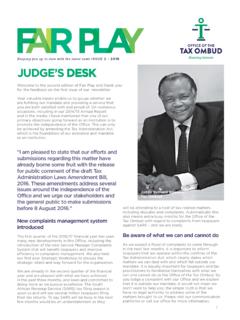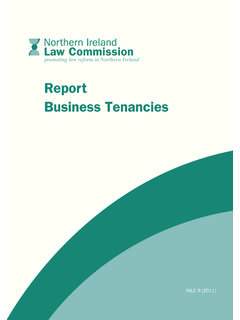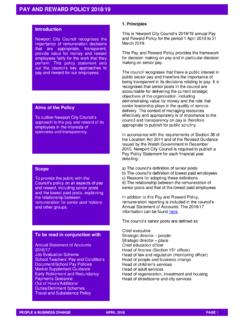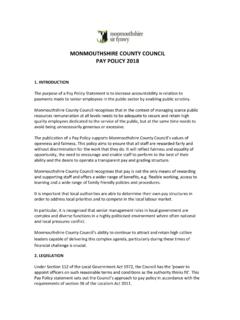Transcription of TAX OMBUD ANNUAL REPORT
1 TAX OMBUD ANNUAL REPORT ITO SECTION 19 OF THE TAX ADMINISTRATION ACT 28 OF 2011 AND THE PUBLIC finance MANAGEMENT ACT (ACT 1 OF 1999)2016/17| iTAX OMBUD ANNUAL REPORT 2016/17 PART C: CORPORATE GOVERNANCE 73 PART D: HUMAN RESOURCE MANAGEMENT 77 PART E: FINANCIAL INFORMATION 83 ANNEXURE 1: 87 PART B: PERFORMANCE INFORMATION 191. SITUATIONAL ANALYSIS 192. PERFORMANCE INFORMATION BY PROGRAMME/OBJECTIVES 523. STRATEGIES TO ADDRESS AREAS OF UNDER PERFORMANCE 72 PART A: GENERAL INFORMATION 11. GENERAL INFORMATION 12. ABBREVIATIONS/ACRONYMS 23. MESSAGE BY THE MINISTER OF finance 44. FOREWORD BY THE TAX OMBUD 65. CHIEF EXECUTIVE OFFICER S OVERVIEW 106. STATEMENT OF RESPONSIBILITY AND CONFIRMATION OF THE ACCURACY OF THE ANNUAL REPORT 147. STRATEGIC OVERVIEW 158. LEGISLATIVE AND OTHER MANDATES 169. ORGANISATIONAL STRUCTURE 17 TABLE OF CONTENTSHIGHLIGHTS OF 2016/17 iiTAX OMBUD S REPORT ON THE INVESTIGATION IN TERMS OF SECTION 16(1)(b) OF THE TAX ADMINISTRATION ACT 28 OF 2011 INTO ALLEGED DELAYED PAYMENT OF REFUNDS AS A SYSTEMIC AND EMERGING ISSUEii |TAX OMBUD ANNUAL REPORT 2016/17 HIGHLIGHTS OF 2016/17In its fourth financial year since inception, the Office of the Tax OMBUD continued to pursue excellence in addressing taxpayers complaints against SARS and contributing towards improving the country s tax administration system.
2 The Office s achievements during the period under review include:LEGISLATIVE AMENDMENTSP roposed changes to the Tax Administration Act were promulgated, and included changing the term of office of the Tax OMBUD from three to five years, giving the OTO powers (with approval from the finance Minister) to initiate investigations into any systemic and emerging issues, giving the Tax OMBUD powers to appoint the staff of the Office without consulting the SARS Commissioner as previously stipulated, and having its budget determined by the finance Minister instead of the revenue IN TERMS OF SECTION 16(1) (b) ACT 28 OF 2011As a result of persistent and increasing numbers of complaints by taxpayers that SARS was unduly delaying the payment of their verified refunds, the Tax OMBUD sought and obtained approval from the Minister to conduct a review of the issue as a systemic and emerging one. The review culminated in a REPORT titled Annexure 1 on page IN CONTACTSThe Office recorded a significant increase in contacts from taxpayers and tax representatives;ENGAGING KEY STAKEHOLDERSE ngagements and collaborations were organised and co-hosted with different stakeholders, in addition to co-hosting webinar presentations with Recognised Controlling Bodies.
3 The purpose of these engagements was to raise awareness about the OTO s services and to discuss important matters in the tax sphere. The Office further facilitated engagements with numerous media owners and journalists, resulting in free publicity valued at R84 086 The coverage included print articles, radio features, television features and online articles. The OTO made significant improvements, creating awareness through the use of social media platforms, with Twitter followers exceeding 2 000-mark of IN STATUREThe OTO and its leadership enjoyed much respect and influence in the tax sphere, with both the Tax OMBUD and CEO speaking at various international events and the senior leadership being invited to present and be part of panel discussions at various events hosted by stakeholders. 15 6582016/175 9042015/163 77112 470 QueriesFinancial year contacts| 1 TAX OMBUD ANNUAL REPORT 2016/171.
4 INTRODUCTIONThe Tax OMBUD s 2016/17 ANNUAL REPORT complies with the Public finance Management Act (PFMA), giving effect to the legislative framework for the regulation of finances in national and provincial government. The Accounting Authority presents the ANNUAL REPORT in line with Section 19 of the Tax Administration Act (TAA), Section 55 of the PFMA and Section of the protocol governing the relationship between the Minister of finance and the Tax ANNUAL REPORTING PERIODThe reporting cycle of the Office of the Tax OMBUD (OTO) is ANNUAL , ending 31 March, as prescribed by the National Treasury (NT). Quarterly reports are compiled and submitted to the NT as per the provisions of the PFMA and Treasury Regulations. This REPORT records the organisational and financial performance for the period 1 April 2016 to 31 March SCOPE OF THE REPORTThe REPORT incorporates financial and performance information based on the approved 2016/17 ANNUAL Performance Plan (APP), which was tabled before Parliament in March 2016.
5 The ANNUAL REPORT provides performance information and governance reports, and incorporates financial information relating to the A: General InformationRegistered name Office of the Tax OmbudRegistered office address Menlyn Corner, 2nd Floor, 87 Frikkie de Beer Street Menlyn, PretoriaPostal address PO Box 12314, Hatfield, 0028 Telephone number (+27) 12 341 9105 Call centre 0800 662 837 Facsimile (+27) 12 452 5013 Email addresses auditors N/ABankers N/ACompany Secretary N/A2 |TAX OMBUD ANNUAL REPORT 2016/17 ACAS Anti-Corruption and Security DivisionADR Alternative Dispute ResolutionAGSA Auditor-General of South Africa AICPA American Institute of Certified Public AccountantsAPP ANNUAL Performance PlanBASA Banking Association of South Africa CA ANZ Chartered Accountants Australia and New ZealandCAI Chartered Accountants IrelandCEO Chief Executive OfficerCAPEX Capital expenditureCMS Complaints management systemCMO Complaints Management OfficeCPA CANADA Chartered Professional Accountants CanadaCTC Cost to CompanyCOSATU Congress of South African Trade Unions EE Employment equityFISA Fiduciary Institute of Southern Africa GAA Global Accounting AllianceGTAC Government Technical
6 Advisory CentreHKICPA Hong Kong Institute of Certified Public AccountantsIAC Institute of Accounting CommerceICAEW Institute of Chartered Accountants in England and WalesICAS Institute of Chartered Accountants of ScotlandIDW Istitut der Wirtschaftsprfer in Deutschland International Fiscal Association of South Africa JICPA Japanese Institute of Certified Public Accountants KZN KwaZulu-NatalMTSF Medium Term Strategic Framework2. ABBREVIATIONS/ACRONYMS2 |TAX OMBUD ANNUAL REPORT 2016/17| 3 TAX OMBUD ANNUAL REPORT 2016/17| 3 TAX OMBUD ANNUAL REPORT 2016/17 NDP National Development PlanNEDLAC National Economic Development and Labour CouncilNSBC National Small Business Chambers NOA Notice of appealNOO Notice of objectionNT National TreasuryOPEX Operating expensesOTO Office of the Tax OmbudPAYE Pay as You EarnPFMA Public finance Management Act 1 of 1999 (PFMA)PEOU Public Entity Oversight Unit PRISA Public Relations Institute of Southern AfricaRCB Recognised Controlling BodiesRPB Recognised Professional BodiesSAIPA South African Institute of Professional AccountantsSAIT South African Institute of Tax PractitionersSARS South African Revenue ServiceSM Service ManagerSOPS Standard Operating Procedures TAA Tax Administration ActTPA Third party appointmentTO Tax OMBUD UK United KingdomUSA United States of AmericaVAT Value Added TaxWIP Work in progressYTD Year to date4 |TAX OMBUD ANNUAL REPORT 2016/173.
7 MESSAGE BY THEMINISTER OF FINANCEHONOURABLE MALUSI GIGABA MINISTER OF finance | 5 TAX OMBUD ANNUAL REPORT 2016/17I am honoured to present the 2016/17 ANNUAL REPORT of the Office of the Tax OMBUD , which is an important government institution. The Office of the Tax OMBUD is central to the social contract between government and citizens, by ensuring that citizens are treated fairly with respect to tax the reporting period, the Office of the Tax OMBUD continued to fulfil its important role of affording thousands of our people an opportunity to be fairly heard on occasions where they have complaints against the South African Revenue Service (SARS). This will strengthen the confidence of taxpayers in our country s tax REPORT is being tabled at a time when we are hard at work assuring our people and the international community that as a country we remain committed in our quest to achieve inclusive growth to the benefit to all our people.
8 We encourage all citizens and residents to continue meeting their tax obligations with pride, and where there are disputes with SARS, to use all the avenues provided to resolve such. The Office of the Tax OMBUD is one such important avenue created by legislation to efficiently deal with complaints by taxpayers. There is therefore no need for taxpayers to neglect their am thus far satisfied with the level of cooperation and the working relationship that exists between the Office of the Tax OMBUD and SARS. It is important for these two organisations to work together, although independently of each other, in speedily resolving the complaints that taxpayers lodge. We encourage all citizens and residents to continue meeting their tax obligations with pride, and where there are disputes with SARS, to use all the avenues provided to resolve such. Our economy continues to grow at a very slow pace, which in turn has direct implications for the capacity of the State to generate much-needed revenue.
9 It is at times like these that we need to emphasise the need for tax compliance so that all revenue due can be collected and used to serve the needs of all people. I am pleased to note that the Office of the Tax OMBUD is doing its share in educating the public about the tax system, as well as by facilitating resolution of disputes between SARS and taxpayers, which will also help SARS to improve the way it renders its services to the am grateful for the work that has been done by my predecessors, both former Ministers Pravin Gordhan and Nhlanhla Nene during the early establishment phase of the Office of the Tax OMBUD . I also wish to commend the Tax OMBUD Judge Bernard Ngoepe and his team for the good work that has been done in the 2016/17 financial GIGABA, MPMINISTER OF FINANCE6 |TAX OMBUD ANNUAL REPORT 2016/174. FOREWORD BY THE TAX OMBUDJUDGE BERNARD MAKGABO NGOEPE, TAX OMBUD6 |TAX OMBUD ANNUAL REPORT 2016/17| 7 TAX OMBUD ANNUAL REPORT 2016/17 For instance, the term of office of the Tax OMBUD , recruitment of employees and determination of our budget have all been amended in the Act, as per our proposals.
10 In simple terms, this means we no longer have to consult the SARS Commissioner when recruiting personnel for the Office, and the budget for the Office will be decided by the Minister of finance , to whom I REPORT directly, instead of being at the discretion of SARS. Although neither the current nor previous Commissioners have ever interfered with our recruitment practices, it is nonetheless a step in the right direction that such an important activity is no longer in the hands of the head of an institution whose functioning we are mandated to scrutinise. Similarly, having our budget determined by Treasury signals our independence from SARS and sends the right message to the taxpayers of South amendments have also paved the way for the Tax OMBUD to conduct reviews of any alleged systemic and emerging matters related to our mandate. For the past three years, stakeholders have been complaining about the Tax OMBUD s lack of power to investigate systemic and emerging matters without complaints being lodged.










